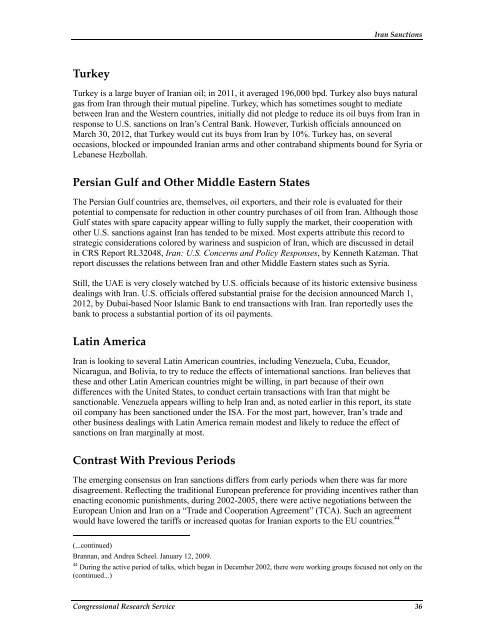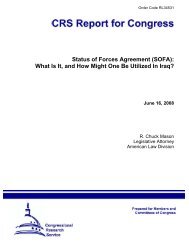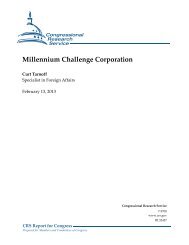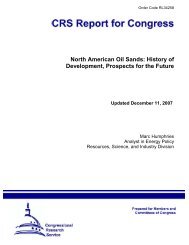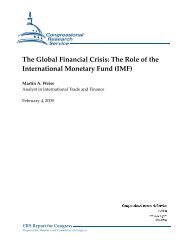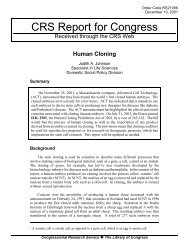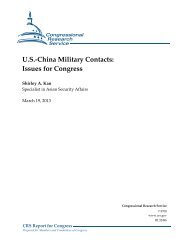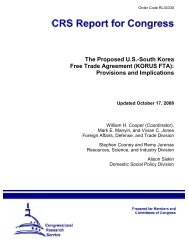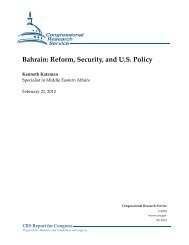Iran Sanctions - Foreign Press Centers
Iran Sanctions - Foreign Press Centers
Iran Sanctions - Foreign Press Centers
You also want an ePaper? Increase the reach of your titles
YUMPU automatically turns print PDFs into web optimized ePapers that Google loves.
Turkey<br />
<strong>Iran</strong> <strong>Sanctions</strong><br />
Turkey is a large buyer of <strong>Iran</strong>ian oil; in 2011, it averaged 196,000 bpd. Turkey also buys natural<br />
gas from <strong>Iran</strong> through their mutual pipeline. Turkey, which has sometimes sought to mediate<br />
between <strong>Iran</strong> and the Western countries, initially did not pledge to reduce its oil buys from <strong>Iran</strong> in<br />
response to U.S. sanctions on <strong>Iran</strong>’s Central Bank. However, Turkish officials announced on<br />
March 30, 2012, that Turkey would cut its buys from <strong>Iran</strong> by 10%. Turkey has, on several<br />
occasions, blocked or impounded <strong>Iran</strong>ian arms and other contraband shipments bound for Syria or<br />
Lebanese Hezbollah.<br />
Persian Gulf and Other Middle Eastern States<br />
The Persian Gulf countries are, themselves, oil exporters, and their role is evaluated for their<br />
potential to compensate for reduction in other country purchases of oil from <strong>Iran</strong>. Although those<br />
Gulf states with spare capacity appear willing to fully supply the market, their cooperation with<br />
other U.S. sanctions against <strong>Iran</strong> has tended to be mixed. Most experts attribute this record to<br />
strategic considerations colored by wariness and suspicion of <strong>Iran</strong>, which are discussed in detail<br />
in CRS Report RL32048, <strong>Iran</strong>: U.S. Concerns and Policy Responses, by Kenneth Katzman. That<br />
report discusses the relations between <strong>Iran</strong> and other Middle Eastern states such as Syria.<br />
Still, the UAE is very closely watched by U.S. officials because of its historic extensive business<br />
dealings with <strong>Iran</strong>. U.S. officials offered substantial praise for the decision announced March 1,<br />
2012, by Dubai-based Noor Islamic Bank to end transactions with <strong>Iran</strong>. <strong>Iran</strong> reportedly uses the<br />
bank to process a substantial portion of its oil payments.<br />
Latin America<br />
<strong>Iran</strong> is looking to several Latin American countries, including Venezuela, Cuba, Ecuador,<br />
Nicaragua, and Bolivia, to try to reduce the effects of international sanctions. <strong>Iran</strong> believes that<br />
these and other Latin American countries might be willing, in part because of their own<br />
differences with the United States, to conduct certain transactions with <strong>Iran</strong> that might be<br />
sanctionable. Venezuela appears willing to help <strong>Iran</strong> and, as noted earlier in this report, its state<br />
oil company has been sanctioned under the ISA. For the most part, however, <strong>Iran</strong>’s trade and<br />
other business dealings with Latin America remain modest and likely to reduce the effect of<br />
sanctions on <strong>Iran</strong> marginally at most.<br />
Contrast With Previous Periods<br />
The emerging consensus on <strong>Iran</strong> sanctions differs from early periods when there was far more<br />
disagreement. Reflecting the traditional European preference for providing incentives rather than<br />
enacting economic punishments, during 2002-2005, there were active negotiations between the<br />
European Union and <strong>Iran</strong> on a “Trade and Cooperation Agreement” (TCA). Such an agreement<br />
would have lowered the tariffs or increased quotas for <strong>Iran</strong>ian exports to the EU countries. 44<br />
(...continued)<br />
Brannan, and Andrea Scheel. January 12, 2009.<br />
44<br />
During the active period of talks, which began in December 2002, there were working groups focused not only on the<br />
(continued...)<br />
Congressional Research Service 36


